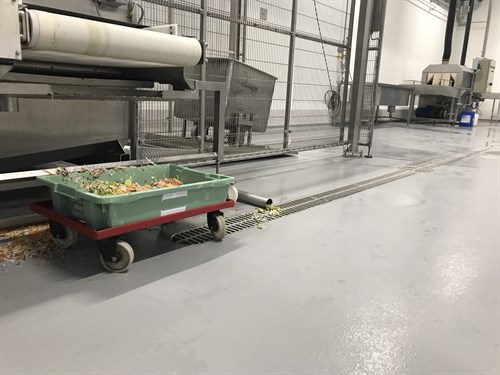Hygiene is undoubtedly a top priority for food and beverage processing plants. Microbes and bacteria flourish in damp conditions. In addition, slips and falls caused by standing water and puddling can be a mounting problem for facilities. A sloped floor with proper drainage can make cleaning faster and easier while mitigating dangerous contaminant buildup and preventing slips and falls.
The Importance of Proper Hygienic Drain Installation
The drainage system is an integral part of a factory, and subsequent changes to the layout of the drainage system can be costly. Common mistakes when planning a drainage system include:
1. insufficient flow capacity to remove all water to avoid water puddling on the floor
2. insufficient capacity to collect waste from processing procedures
3. inadequate access for cleaning inside the drainage system.
Materials used in drainage must not be vulnerable to hot water and chemicals used in cleaning processes. Proper procedures must ensure that cracks will not form around drains since any opening can promote and potentially harbor bacterial growth. Choosing an efficiently designed drainage system that takes care of these factors will provide long-term benefits and savings.

Sanitary design in a food and beverage facility: resinous floor pitched to a hygienic drain,
with a composite polymer curb system for protection at the wall.
Pitch and Tolerance
In wet areas, standing water on floor surfaces should be prevented to promote proper hygiene and prevent slips. Evaporating liquids become chemically more aggressive and reduce the lifepsan of a floor. Additionally, scale deposits can build up, which are difficult to remove and may harbor bacteria.
When it comes to required pitch, considerations should be made to the activity in the area, whether a floor is permanently wet or dry, the frequency and nature of any spills, and required cleaning methods. Generally, more textured floors will require steeper pitch to be free draining.
Proper pitch to drain is required to prevent puddling. Floors should be specified such that over a 3 m length, a tolerance of 3 mm under a 3-meter straight edge or better is acceptable. A simplified method to check whether water is efficiently running off from the sloped area is to use a healthy amount of water to test. In one hour’s time, the area shall be completely free of standing water with no remaining puddles.
Floors in dry production areas should normally be flat <1%, (< 10 mm/m) for ease of construction; slopes in wet areas should be up to 2% (< 20 mm/m); extreme pitching should be avoided. Generally, a pitch of 1.5% (15 mm/m) provides a largely free draining floor.
It should be noted that especially in greasy environments, a steeper pitch will require a more slip-resistant surface to ensure worker safety.
How Stonhard Can Help
Stonhard is committed to providing the food and beverage industry with the best solutions for meeting hygienic standards. Our seamless, resinous, HACCP-certified flooring systems are designed specifically to do just that. That's why we partnered with Blücher, a world-leading producer of EHEDG-certified, stainless steel, sanitary drainage systems.
Blücher’s all-stainless steel drainage systems ensure excellent flow capacity and optimum hygiene along with minimum maintenance. Blücher HygienicPro® drains stand up to high-temperature disinfecting and are chemical resistant. Click here to learn more about commercial hygienic drains by Blücher.
Combine Proper Drainage with the Right Flooring from the Start
Urethane and epoxy flooring systems solve a number of food safety problems. By nature, poured-in-place resinous floors are impervious to water and are poured or trowel-applied seamlessly over concrete substrates. Contaminants remain on the surface of the floor and are washed away during scheduled sanitation times.
The most popular Stonhard floors found in the food and beverage market are Stonclad UT, Stonclad UF and Stonclad UR. These urethane flooring systems are hard, impact-resistant surfaces designed to withstand thermal shock and exposure to organic acids, caustics, and aggressive cleaning agents.
Seamless floor and wall systems provide the slip-resistant, cleanable, durable, and chemical-resistant surface necessary for long-term performance in food & beverage, and pharmaceutical facilities.
With a century in business, Stonhard is the unprecedented leader in manufacturing and installing high-performance seamless, floor, wall, and lining systems. Our epoxy and urethane floors provide waterproofing and pitch for water drainage and are the ultimate in hygienic protection. Learn more here.
Click here to request a site visit to get recommendations on a sanitary flooring system with tailored installation for your facility. Download our free whitepaper, “A Total Hygienic Solution – Floor, Drain, and Curb Research” for guidelines on sanitary design in food and beverage and pharmaceutical facilities.